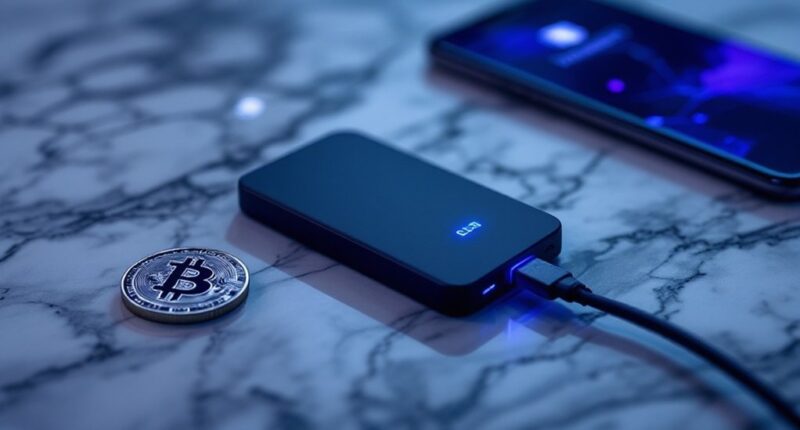Choosing the best crypto wallet is like picking the perfect backpack for a hiking adventure: it needs to be secure, versatile, and user-friendly. A wallet should have strong security features like multi-factor authentication and encryption, much like a bouncer keeping unwanted guests out. It’s also important to support various cryptocurrencies, just like a trusty backpack holds all essentials. Pay attention to backup options and fees, as these can make or break your journey. Stick around for handy tips!

How does one navigate the complex world of crypto wallets without feeling like they’re trying to access the secrets of an ancient civilization? The answer lies in understanding what makes a great wallet tick.
First and foremost, security is paramount. A wallet with multi-factor authentication—think of it as the bouncer at an exclusive club—guarantees that only you can access your precious assets. Encryption of private keys adds another layer, akin to placing your valuables in a safe. Open-source code means tech-savvy individuals can examine it for vulnerabilities, much like a detective scrutinizing a crime scene. Regular security audits keep the wallet updated against the latest threats. Additionally, non-custodial wallets require proper backup strategies to ensure you don’t lose access to your funds. For instance, the Ledger Stax features a Secure Element that enhances resistance to physical attacks, making it a robust option for security-conscious users.
Next, consider the cryptocurrencies the wallet supports. A versatile wallet that accommodates Bitcoin, Ethereum, and even ERC-20 tokens is akin to a universal remote that controls all your devices. Plus, cross-chain compatibility means you can switch between different blockchains effortlessly. Nobody likes being stuck with just one flavor of ice cream, right? Paper wallets provide the highest level of security by keeping your keys completely offline.
User interface and experience are also vital. An intuitive design is like a well-marked map guiding you through uncharted territory. Mobile apps for both iOS and Android enable transactions on-the-go, while built-in exchange features let you trade without the hassle of jumping through multiple hoops.
Backup and recovery options are your safety net. A seed phrase acts as your treasure map; lose it, and you risk losing everything. Syncing across multiple devices or using hardware wallets can further safeguard your assets.
When it comes to fees, understanding transaction structures is essential. Some wallets have fixed fees while others take a percentage. It’s like choosing between a flat rate for pizza delivery or paying extra for toppings—know what you’re getting into.
Lastly, regulatory compliance is vital. KYC/AML procedures confirm that wallets play by the rules, providing peace of mind.
With all these features weighing in, selecting the right crypto wallet becomes less intimidating and more like a treasure hunt—minus the pirates, of course.
Frequently Asked Questions
What Are the Security Features of Different Crypto Wallets?
Different crypto wallets offer a variety of security features.
Hardware wallets store private keys offline, like a safe for your cash, while software wallets use encryption and biometric logins—think of them as digital bouncers at a club.
Multi-signature wallets require multiple approvals for transactions, adding layers of protection.
Meanwhile, decentralized wallets keep users in control of their keys, eliminating a central target.
Each type balances security and convenience in unique ways.
Can I Use Multiple Wallets for Different Cryptocurrencies?
Absolutely, using multiple wallets for different cryptocurrencies is not just possible; it’s often a smart move.
Imagine trying to juggle flaming torches—one wallet for each currency might help avoid disaster! With hot wallets for daily transactions and cold wallets for long-term storage, users can manage their assets efficiently.
However, keep in mind that more wallets mean more responsibility. Tracking credentials and securing each wallet is essential to keep those digital coins safe and sound.
How Do I Recover Lost Access to My Crypto Wallet?
Recovering lost access to a crypto wallet can feel like searching for a needle in a digital haystack.
If it’s a hardware wallet, users can reset it and carefully enter their seed phrase—think of it as a secret code to open a treasure chest.
For software wallets, reinstalling the app and restoring from a backup can work wonders.
If all else fails, professional recovery services might swoop in like tech superheroes, albeit for a fee.
Are Hardware Wallets Worth the Investment?
When pondering the worth of hardware wallets, one might consider them like a high-tech safe for digital treasure.
They’re more secure than a fortress, protecting private keys from cyber pirates. With features like multi-signature functionality and offline storage, they’re a fortress that even the most determined hacker would struggle to breach.
However, they can be pricey and less convenient for daily trading. Ultimately, for serious investors, they can be a worthwhile investment in peace of mind.
What Fees Are Associated With Crypto Wallets?
When exploring crypto wallets, one must consider several fees.
Transaction fees, influenced by network congestion, can range from a few dollars to over $60 for Bitcoin.
Then there are exchange fees, often between 0.1% to 0.5%, plus withdrawal and deposit costs.
Wallet-specific fees may include hardware purchases or service charges.
Additionally, hidden fees like currency conversion and inactivity fees lurk around, ready to pounce when least expected, much like a cat in a shadow.









